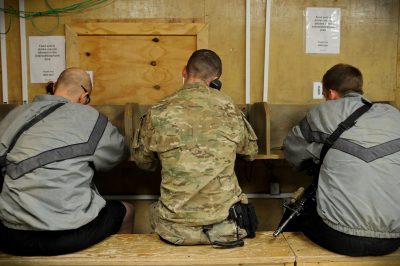They formed their own shadow army, some 90,000 in the country at its peak, but their problematic predomination is coming to an end.

All Global Research articles can be read in 51 languages by activating the “Translate Website” drop down menu on the top banner of our home page (Desktop version).
***
The golden post-9/11 years of the war contractor — the providers of food and transportation, fuel, construction, maintenance, IT, not to mention security and interrogation services for the U.S. military — appear to be drawing down.
With the (hopeful) withdrawal of the remaining 3,600 troops in Afghanistan by September, attention is also on the nearly 17,000 contractors on the U.S. payroll there, 6,147 of whom are American citizens.
“The U.S. contractors will come out as we come out. That is part of the planned withdrawal we have in place right now,” said CENTCOM Commander Gen. Kenneth McKenzie, in a briefing with reporters last week.
Despite earlier reports that the government has numerous contracts with companies stretching far beyond the deadline to leave, it would appear the thrust of U.S. operations in Afghanistan is diminishing, and the withdrawal has begun. Even if that takes a while, or the United States manages to keep some presence in the country after Sept. 11, the private sector footprint will never be as big as it was at its height in 2011, when there were over 90,000 contractors in Afghanistan. At times, including now, contractors outnumbered uniformed personnel.
To put it into perspective, there were 155,000 contractors in Iraq and Afghanistan, compared to 145,000 active duty service members, in 2011. Contractors made up 62 percent of the workforce. The money paid to contractors is even more daunting: $104 billion for services in Afghanistan alone since 2002, nearly $9 billion just in the last five years.
With so much dependence on contractors, came trouble. Huge companies like Halliburton, with subsidiaries such as KBR, took advantage. Not only were companies overcharging and caught engaging in fraud during the early salad days, but worse, they cut corners to make more money. Who could forget the flimsy, defective showers and electrical systems electrocuting troops throughout Iraq? The unsafe drinking water on bases? Spoiled food?
Then there are the contractors who helped torture inmates at Abu Ghraib, and massacred civilians at Nisour Square. Armed mercenaries who rolled with our CIA in secret, trained troops, guarded dignitaries.
Many died with no mention in the papers, came home injured and sick with none of the benefits of Pentagon health care or VA. They were a shadow army really, a massive experiment in how Uncle Sam could wage war across several countries cheaper and longer by leaning on the private sector to do it. But it wasn’t cheaper, and the cost not just in dollars: for every positive thing contractors did in-country, there is a school or a hospital or some facility that literally won’t stand after we’re gone. Afghan security forces that won’t be able to challenge the Taliban, bridges and infrastructure that will crumble. The largesse was corruptible and it was corrupted.
Halliburton and KBR and Blackwater are names of the past. But they got their gold, they care not about “the graveyard of empires.” Others, like Fluor Group, which provides logistical support to the military currently in Afghanistan, are going to see an end to the lush days, and they’re feeling it.
“The timetable to do this properly is already too tight,” said David Berteau, president of the Professional Services Council representing 400 government contractors, many working in Afghanistan. “We don’t have years, we have only months.”
All good things must come to end, right?













